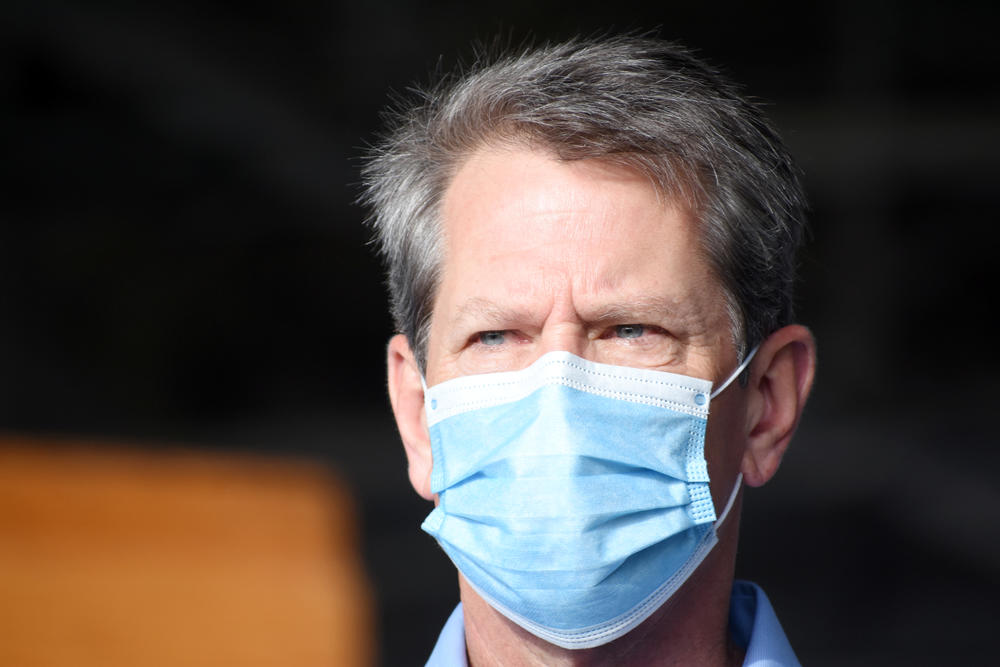
Caption
Gov. Brian Kemp at the beginning of a statewide tour urging Georgians - but not requiring them - to wear a mask.
Credit: Stephen Fowler / GPB News

Gov. Brian Kemp at the beginning of a statewide tour urging Georgians - but not requiring them - to wear a mask.
Gov. Brian Kemp published a fiery op-ed in the Atlanta Journal-Constitution over the weekend accusing the state's largest paper of publishing coronavirus information "with no context provided" while not challenging any of the outlet's exhaustive reporting on the global pandemic.
On the same day the state crossed the threshold of a quarter million confirmed cases and 5,000 dead from COVID-19, the Republican official took aim at the AJC's news side for the slight of keeping readers informed about the state's response and the opinion side for expressing its opinion.
RELATED: Somber Milestone: COVID-19 Deaths In Georgia Top 5,000
"The editorialized front page is crawling with sensational 'news' that undermines confidence in state agencies and school leaders," Kemp wrote. "And when their anger boils over, the Editorial Board prints a list of baseless grievances coupled with a clickbait headline."
One headline this week: "Kemp lashes out at coverage of White House COVID report critical of Georgia." That's when the governor accused the newspaper of inciting panic by publishing a leaked report that showed Georgia led the nation for the rate of new coronavirus infections over a one-week span.
Kemp's office pointed to other metrics, also included in the report and the AJC's article, that showed a sharp decline in hospitalizations and the rolling average of new cases. Notably, there has been no dispute of any factually reported information.
In the governor's op-ed, he notes the seven-day moving average of new cases is the lowest since July 10. This is true, and looking at both the date of report and the date of onset, Georgia has seen a marked decline in cases from a peak in early July while more than 2 million tests have been completed.
He notes the positivity rates of new reported tests statewide have decreased from 11.86% July 27 to 9.2% on August 20. Georgia has seen a decline in that positivity rate – but the nationwide average is just about 6% positive, according to data from Johns Hopkins University.
Hospitalizations have dropped by more than 600 since the beginning of August to about 2,361.
But on July 1, the day Kemp embarked on a statewide tour imploring residents to wear a mask and opting not to enact a statewide mask mandate, there were 1,570 hospitalizations, 84,000 cases and 2,827 reported deaths.
“We shouldn’t get to that,” Kemp said at the time. “We shouldn’t need a mask mandate for people to do the right thing.”
A new executive order allows local governments to enact public mask ordinances if they meet a certain coronavirus case threshold for the previous two weeks, something that all but three counties currently meet and several jurisdictions have done – but only after a lawsuit and public spat between the governor and Atlanta Mayor Keisha Lance Bottoms.
IN-DEPTH:Kemp Allows Local Governments To Require Masks – With Some Restrictions
The City of Atlanta passed a mask mandate, like several other mostly Democratic-led cities, but Bottoms also rolled back the city's reopening plan, which led to confusion for some businesses thinking they had to close.
Kemp has long said the state is fighting on two fronts – the health measures to combat COVID-19 and economic decisions to keep businesses open and minimize the negative fiscal impact.
Georgia was one of the first states to aggressively reopen after a shelter-in-place order, and final revenue numbers show only a fraction of the state's rainy day fund will need to be used to close the gap. The state's unemployment rate stands at 7.3%, lower than the nationwide average of 10.2%
But Georgia's unemployment trust fund is down nearly 90% from its balance in mid-March, with a balance of about $268 million after the Department of Labor processed more initial unemployment claims in the last five months than the previous eight years combined.
"The only way to beat COVID-19 is by having all Georgians make smart decisions," the governor wrote in his op-ed. "You can mandate masks and issue stay-at-home orders, but every person will ultimately decide what to follow and what to ignore. People – not government – stop the spread. Georgians doing the right thing will make a difference, not smug editorials."
In the months since the pandemic began, the AJC and other news outlets in Georgia have sought to hold officials accountable for decisions made (or not) to combat the virus, provide context to often confusing and incomplete public health data released by the state and educate Georgians about the plight of business owners trying to survive in unprecedented conditions.
There have been efforts to honor and highlight lives lost or forever changed by the coronavirus, something largely missing from any of the governor's messages over the last five months.
And as the next phase of the pandemic response comes with students returning to school in-person and online, each with their respective reported challenges, journalists across Georgia will continue to cover a story that also impacts them in a fair and balanced manner.